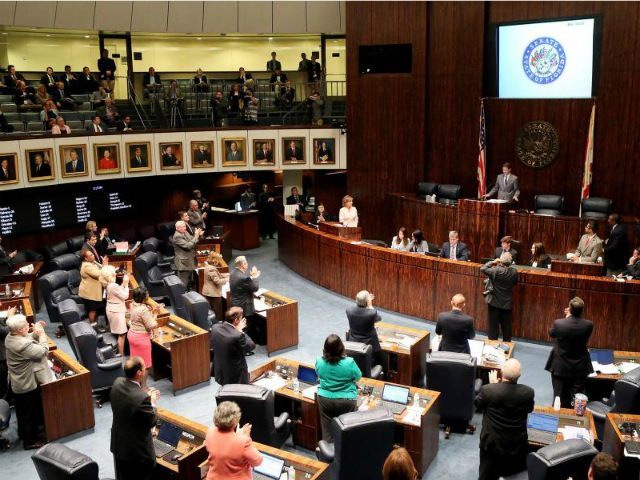The federal government has just bailed out Florida’s embattled legislature by giving them more Low Income Pool (LIP) dollars to pay for health care, essentially giving them the funds they need to come to a state budget agreement in the upcoming special session.
As many already know, the more conservative Florida House, who has held strong with their opposition to Medicaid expansion, shut down budget negotiations after the more moderate Florida Senate would not budge from supporting the Medicaid expansion.
Florida House Speaker Steve Crisafulli (R-Merritt Island) welcomes the LIP dollars, which he agrees will help lawmakers “finish the budget.”
The Florida Senate, who has been pressing the Florida House to go along with their efforts to expand Medicaid under Obamacare, will surely take this LIP money and run, saving them from anymore negative public scrutiny over their embrace of the dreaded Obamacare law.
Senate President Andy Gardiner—who is front-and-center supporting the Medicaid expansion and who also works for an Orlando Hospital that will benefit from the Medicaid expansion—wrote a letter to all of his Senate colleagues:
This morning we received a copy of a letter from Centers for Medicare and Medicaid Services (CMS) offering preliminary feedback regarding the amount of LIP funding Florida can expect to receive for the 2015-16 fiscal year.
The letter is attached for your reference. In summary, CMS has outlined a step back to the traditional (pre-2014) level of LIP funding. This $1 billion in total LIP spending authority represents less than half of the current year authority of $2.2 billion. Additionally, CMS believes allowing this level for the 2015-16 fiscal year will help Florida transition to a base level of $600 million in subsequent years.
This news brings certainty to what we have known for over a year – the LIP program is changing and Florida needs a new way to address uncompensated care.
Throughout the 2015 Regular Session, the Senate used a conservative approach to budgeting, setting aside funding to prepare for a decline in LIP. These additional state dollars allow Florida to mitigate the loss of LIP funding in the short term. However, as explained by our state economist Amy Baker, using state dollars to replace federal funding forces us to supplant other priorities and damages our economy.
It remains clear that a sustainable long-term solution is needed. As you are aware, the Senate has proposed a Florida solution that will promote the well-being of our constituents and protect the fiscal health of our state.
While the letter from CMS outlines a number of policy alternatives, none of these options will allow Florida to maximize both state and federal taxpayer dollars in a more effective manner than by reducing the number of uninsured Floridians seeking basic health care in hospital emergency rooms. Clearly, a conservative free-market expansion of health care coverage is the most fiscally responsible approach.
While we may not agree with every policy decision that comes from the federal government, I do agree that coverage, rather than backend supplemental payments, is a better investment for our taxpayers. With today’s direction from the federal government, we will continue to work towards a responsible long-term Florida solution. Special Session will give us the opportunity to address health care within the context of our budget. I look forward to seeing you on June 1.
Basically, what has just happened is that the Florida legislature just received a one-year health care bailout and will have to address this problem next year.
This is “kick the can down the road” politics at its finest.
State Senator Kelli Stargel (R-Lakeland), who supports taking federal Medicaid expansion dollars, seems to agree that the Florida legislature just “punted” the Medicaid expansion football into next year, saying that a very serious “conversation” needs to be had to address this health care-covering problem that “does not seem to go away”:
I am opposed to taking Medicaid dollars in a way that has a lot strings. I am very support of having a conversation, because the problem does not go away, whether we do the fixed program the Senate has proposed, or whether we do not make any proposal, we need to have a conversation.
If we are not going to do any kind of a combo fix or otherwise, we still have the people in the state of Florida who fall where they can’t afford health insurance, yet are too poor to be on Medicaid, or they are not getting health insurance. That problem exists.
Stargel went on to add that she firmly believes that federal dollars are taxpayer dollars being held hostage:
These are my dollars, these are your dollars, these are Florida dollars. It is almost like a hostage negotiation, ‘what do I have to do to get my own dollars back here, and is it worth it, and am I going to do it, that’s really the bigger discussion.
I do not want to hamstring Florida in a way that it is not sustainable. I would love Florida to be autonomous from the federal government and I rather have a situation where our dollars didn’t have to go there to begin with, or was very clear what happened.
We don’t have that situation now. I don’t think the fix is clear.
The fix still requires us to make some expansions. Now, the fix is better. The fix does say you have to have a job. And the fix does say that you have to be in school.

COMMENTS
Please let us know if you're having issues with commenting.